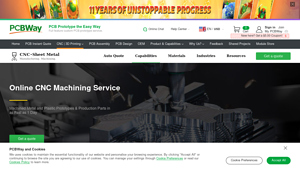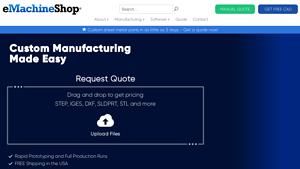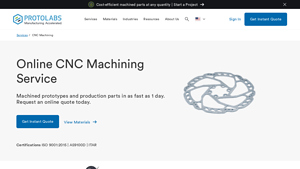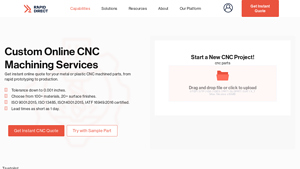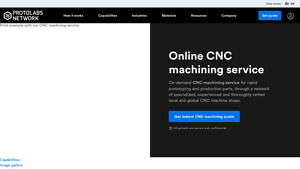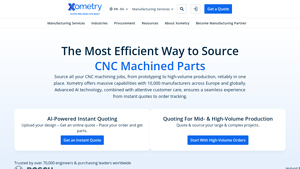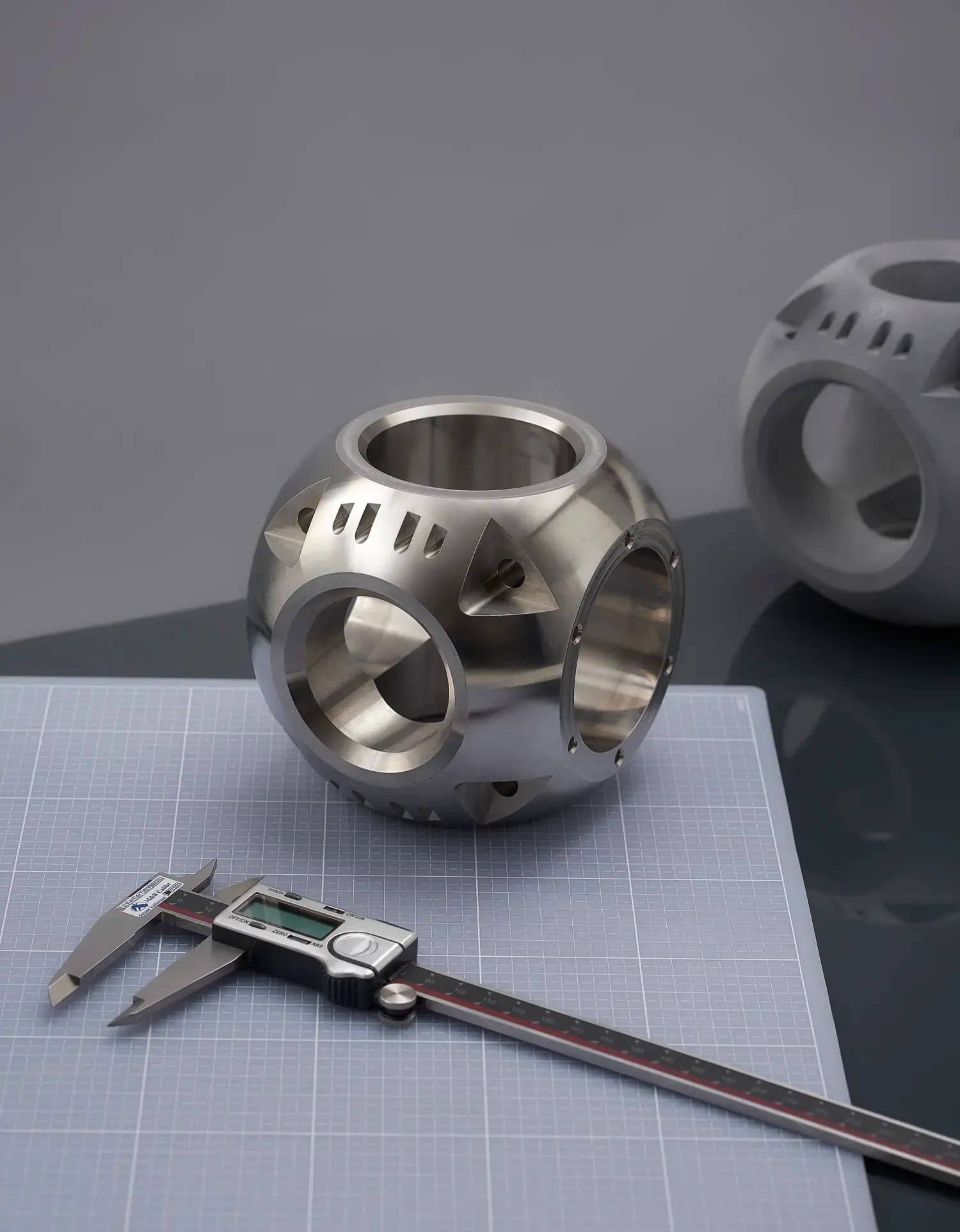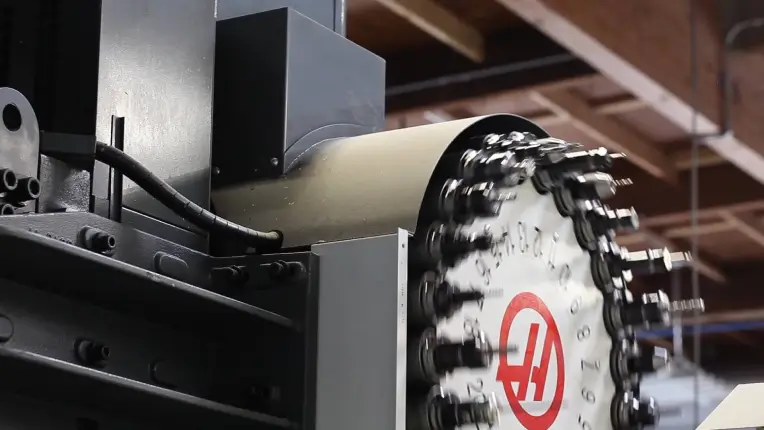Top 8 Online Machining Services Manufacturers & Suppliers List
1. PCBWay – CNC Machining Services
Domain: pcbway.com
Registered: 2012 (13 years)
Introduction: CNC Machining Service includes precision CNC machining and rapid prototyping parts. Key features include CNC milling (3-, 4-, & full 5-axis), CNC turning, and various 3D printing methods (FDM, SLA, SLS, MJF, DMLS, Polyjet). Materials available for CNC machining include metals (Aluminum, Stainless steel, Brass, Copper, Titanium, Mild steel, Alloy steel, Tool steel, Spring steel) and plastics (ABS, …
2. PartsBadger – CNC Machining Services
Domain: parts-badger.com
Registered: 2016 (9 years)
Introduction: PartsBadger offers a variety of online CNC machining services including multi-axis machining, Swiss CNC machining, surface finishes, injection molding, 3D printing, sheet metal services, urethane casting, and investment casting. Key features include:
– Instant Quote system for immediate pricing based on dimensions, material, finish, and features.
– Rapid Quote available for higher volumes or spe…
3. eMachineShop – Custom Manufacturing Services
Domain: emachineshop.com
Registered: 1999 (26 years)
Introduction: eMachineShop offers custom manufacturing services including CNC machining, sheet metal fabrication, injection molding, and 3D printing. Key features include:
– Fast quotes and free CAD software.
– Custom sheet metal parts available in as little as 3 days.
– Supports various CAD file formats: STEP, IGES, DXF, SLDPRT, STL, AMF, CGR, HCG, HSF, IFC, PRT, PRTDOT, SAT, SLDLFP, VDA, WRL, XAML, X_B, OBJ.
…
4. Protolabs – CNC Machining Services
Domain: protolabs.com
Registered: 2006 (19 years)
Introduction: Online CNC Machining Service offering cost-efficient machined parts at any quantity. Capabilities include CNC Milling and CNC Turning, with production times as fast as 1 day. Materials available include various grades of plastics and an extensive library of metals such as Aluminum, Brass, Copper, Stainless Steel, and Alloy Steel. Certifications include ISO 9001:2015, AS9100D, and ITAR. The service…
5. RapidDirect – Custom CNC Machining Services
Domain: rapiddirect.com
Registered: 2010 (15 years)
Introduction: Online CNC Machining Services for Custom Parts, Instant CNC Quote, Capabilities include CNC Machining, CNC Milling, CNC Turning, Injection Molding, Plastic Injection Molding, Injection Mold Tooling, Sheet Metal Fabrication, 3D Printing, Vacuum Casting, Die Casting, Finishing Services, Rapid Prototyping, On-Demand Manufacturing Solutions. Industries served: Aerospace, Automotive, Consumer Products,…
6. Dassault Systèmes – CNC Machining Service
Domain: 3ds.com
Registered: 1995 (30 years)
Introduction: CNC Machining Service by Dassault Systèmes® 3DEXPERIENCE Make is an On-Demand Manufacturing platform connecting designers or engineers with industrial CNC Machining service providers, primarily in North America and Europe. The service handles small to large runs and offers prototyping options. Key features include an instant quote engine providing quotes in seconds, secure payments, and protected …
7. Hubs – On-Demand CNC Machining Service
Domain: hubs.com
Registered: 1998 (27 years)
Introduction: Online CNC Machining Service: On-demand CNC machining service for rapid prototyping and production parts. Capabilities include CNC milling and CNC turning with access to over 1,000 milling centers and 300 turning centers. Tolerances down to ±.020 mm (±.001 in) and lead times from 5 business days. Materials include various metals (e.g., Aluminum, Brass, Copper, Stainless Steel, Titanium) and plasti…
8. Xometry – CNC Machining & 3D Printing Services
Domain: xometry.eu
Introduction: Xometry offers a range of CNC machining services including CNC turning, milling, drilling, and various cutting methods such as laser cutting, plasma cutting, and waterjet cutting. They provide advanced 3D printing technologies like HP Multi Jet Fusion, Fused Deposition Modeling, Selective Laser Sintering, and more. Additional manufacturing services include injection moulding, compression moulding,…
Introduction: Navigating the Global Market for online machining services
In today’s rapidly evolving global market, sourcing online machining services presents a unique challenge for B2B buyers, particularly those in regions such as Africa, South America, the Middle East, and Europe. The need for precision-engineered components—whether for aerospace, medical devices, or industrial machinery—demands not only technical expertise but also a streamlined approach to procurement. This guide aims to demystify the complexities of online machining services, providing an in-depth exploration of various types, including CNC milling, turning, and routing, as well as their diverse applications across industries.
International buyers will benefit from insights into supplier vetting processes, ensuring they partner with certified and reliable manufacturers capable of meeting stringent quality standards. Additionally, the guide addresses critical factors such as cost considerations, lead times, and shipping logistics, which are vital for optimizing supply chain efficiency. By equipping decision-makers with actionable intelligence and strategic approaches, this resource empowers businesses to make informed purchasing decisions, ultimately enhancing their competitive edge in the global marketplace. Whether you’re in Vietnam, Saudi Arabia, or beyond, understanding the nuances of online machining services is essential for driving innovation and growth in your operations.
Understanding online machining services Types and Variations
| Type Name | Key Distinguishing Features | Primary B2B Applications | Brief Pros & Cons for Buyers |
|---|---|---|---|
| CNC Milling | Utilizes rotating cutting tools to remove material. | Aerospace, automotive, industrial | Pros: High precision, complex geometries. Cons: Setup time can be lengthy. |
| CNC Turning | Involves rotating the workpiece against a fixed tool. | Medical devices, electronics | Pros: Excellent for cylindrical parts. Cons: Limited to rotational geometries. |
| CNC Routing | Uses a router to cut materials, often in sheets. | Signage, furniture, cabinetry | Pros: Versatile for various materials. Cons: Less suitable for intricate details. |
| 3D Printing | Adds material layer by layer for complex shapes. | Prototyping, custom parts | Pros: Rapid prototyping, complex designs. Cons: May not be as strong as machined parts. |
| Sheet Metal Fabrication | Involves cutting, bending, and assembling metal sheets. | HVAC, automotive, electronics | Pros: Cost-effective for large volumes. Cons: Less precision compared to CNC machining. |
What Are the Key Characteristics of CNC Milling Services?
CNC milling services are characterized by their use of rotating cutting tools that remove material from a stationary workpiece. This method allows for high precision and the ability to create complex geometries, making it suitable for applications in industries such as aerospace, automotive, and industrial machinery. B2B buyers should consider factors such as the complexity of their designs and the required tolerances when selecting a milling service.
How Does CNC Turning Differ in Application and Suitability?
CNC turning services specialize in creating cylindrical parts by rotating the workpiece against a fixed cutting tool. This method is ideal for applications in medical devices and electronics, where precision is critical. Buyers should consider the shape and size of the parts they need, as turning is limited to rotational geometries. The speed of production and cost-effectiveness are also important factors to evaluate.
What Are the Advantages of CNC Routing for B2B Buyers?
CNC routing services utilize routers to cut materials, typically in sheet form. This method is highly versatile and can handle a variety of materials, including wood, plastic, and metal. Common applications include signage and cabinetry. B2B buyers should assess the material types and thicknesses required for their projects, as routing may not be suitable for intricate details, which could impact design fidelity.
Why Choose 3D Printing for Rapid Prototyping Needs?
3D printing services offer a layer-by-layer additive manufacturing process that enables the creation of complex shapes and rapid prototyping. This method is particularly advantageous for custom parts where traditional machining may be too time-consuming or costly. Buyers should consider the strength and durability of the printed materials, as 3D printed components may not always match the robustness of machined parts, depending on their application.
How Does Sheet Metal Fabrication Fit into Online Machining Services?
Sheet metal fabrication encompasses various processes such as cutting, bending, and assembling metal sheets. This service is often used in industries like HVAC and automotive, where large volumes of parts are needed. Buyers should evaluate the cost-effectiveness for bulk orders, while also considering the precision and finishing options required for their specific applications. While it may not achieve the same level of precision as CNC machining, it is a viable option for many manufacturing needs.
Key Industrial Applications of online machining services
| Industry/Sector | Specific Application of online machining services | Value/Benefit for the Business | Key Sourcing Considerations for this Application |
|---|---|---|---|
| Aerospace | Manufacturing of aircraft components | High precision and lightweight parts reduce fuel consumption | Compliance with aerospace standards (AS9100, ITAR) |
| Medical Devices | Production of surgical instruments | Customization ensures better fit and function for patient needs | ISO certifications and material traceability |
| Robotics | Creation of robotic arms and components | Enhanced performance through tailored designs | Compatibility with existing systems and materials |
| Electronics | Fabrication of enclosures and PCB components | Accelerated time-to-market for electronic devices | Quality assurance and adherence to electrical standards |
| Automotive | Production of engine components and prototypes | Improved vehicle performance and reduced emissions | Precision tolerances and material certifications |
How Are Online Machining Services Utilized in Aerospace Manufacturing?
In the aerospace industry, online machining services are integral for producing lightweight, high-precision components such as brackets, housings, and engine parts. These services solve the challenges of traditional manufacturing by offering rapid prototyping and quick turnaround times, which are essential for meeting strict project deadlines. Buyers in this sector must prioritize suppliers with certifications like AS9100 and ITAR compliance to ensure adherence to safety and quality standards, especially when sourcing from international markets.
What Role Do Online Machining Services Play in Medical Device Production?
Online machining services are crucial in the medical device sector, where custom surgical instruments and implants are required. These services enable manufacturers to create tailored solutions that meet the specific needs of healthcare providers and patients. The key requirements for buyers include ensuring that suppliers possess ISO certifications and can provide material traceability, which is critical for compliance with regulatory standards. This focus on quality helps mitigate risks associated with patient safety.
How Are Robotics Companies Leveraging Online Machining Services?
Robotics companies utilize online machining services to produce intricate components like robotic arms and joints. These services address the need for precision and customization, allowing for enhanced functionality and performance of robotic systems. Buyers must consider the compatibility of machined parts with existing robotic systems and the sourcing of advanced materials that can withstand operational stresses. This is particularly important for international buyers looking to maintain high standards of quality and performance.
Why Are Electronics Manufacturers Turning to Online Machining Services?
In the electronics sector, online machining services are used for fabricating enclosures and components for printed circuit boards (PCBs). This service accelerates the development process, enabling faster time-to-market for new electronic devices. Buyers should focus on suppliers that can guarantee quality assurance and compliance with electrical standards, as this ensures the reliability of the final product. International buyers must also consider lead times and shipping logistics when sourcing these components.
How Do Automotive Manufacturers Benefit from Online Machining Services?
Automotive manufacturers leverage online machining services for producing engine components and prototypes that require high precision and durability. These services help improve vehicle performance while reducing emissions, aligning with global sustainability goals. Buyers in this sector should emphasize precision tolerances and the availability of material certifications to ensure that components meet stringent automotive standards. This is particularly relevant for international buyers aiming to compete in a global market.
3 Common User Pain Points for ‘online machining services’ & Their Solutions
Scenario 1: Navigating Complex Material Specifications
The Problem:
B2B buyers often face challenges in specifying the right materials for their machining projects. With a plethora of options available, including various metals and plastics, selecting the appropriate material that meets both performance and cost requirements can be daunting. For instance, a buyer in the aerospace sector may struggle to determine whether to use aluminum or titanium for a specific component, weighing factors like weight, strength, and corrosion resistance. This indecision can lead to delays in production timelines and increased costs if the wrong material is selected.
The Solution:
To overcome this challenge, buyers should engage in thorough research and consultation before finalizing their material choices. Utilizing online machining service platforms that offer instant quoting and material data can significantly aid in this process. For instance, platforms like Xometry provide detailed specifications for over 40 materials, allowing buyers to compare properties such as tensile strength, thermal conductivity, and machinability. Additionally, buyers should take advantage of the design-for-manufacturability feedback offered by these services when uploading CAD files. This feedback can help identify the most suitable materials based on the part’s intended use and manufacturing constraints, ensuring that the selected material aligns perfectly with project requirements.
Scenario 2: Ensuring Quality and Compliance in Machined Parts
The Problem:
Quality assurance is a critical concern for B2B buyers, especially in industries such as medical and aerospace, where stringent regulations apply. Buyers may worry about whether the online machining service adheres to necessary certifications and quality standards. For example, a buyer might need parts that comply with ISO 13485 for medical devices but is unsure if the selected service provider can meet these requirements. This uncertainty can lead to potential product recalls or regulatory penalties, causing significant financial and reputational damage.
The Solution:
To mitigate these risks, buyers should prioritize sourcing from online machining services that are certified and compliant with relevant industry standards. Before placing orders, buyers should verify the certifications of the machining service provider, such as ISO 9001:2015, ISO 13485, and ITAR registration. Furthermore, engaging in proactive communication with suppliers can clarify quality assurance processes, including inspection protocols and traceability of materials. Buyers should also request Certificates of Compliance (CoCs) for critical components, which can serve as proof that the parts meet specified requirements. By taking these steps, buyers can ensure that their machined parts are of high quality and compliant with industry standards, reducing the risk of future complications.
Scenario 3: Handling Lead Time and Delivery Challenges
The Problem:
In today’s fast-paced market, lead times can make or break a project. B2B buyers often experience frustration when dealing with lengthy production timelines and unreliable shipping estimates. For instance, a manufacturer in South America may require rapid prototypes to meet tight deadlines for a new product launch, but delays from the machining service can jeopardize the entire schedule. This unpredictability can lead to increased costs and strained relationships with clients.
The Solution:
To address lead time concerns, buyers should select online machining services that explicitly communicate their production capabilities and timelines. It is advisable to look for services that offer rapid prototyping and have a proven track record of meeting deadlines. Additionally, using platforms that provide instant quotes and clear lead time estimates can help buyers plan accordingly. For urgent projects, buyers can utilize expedited shipping options and ensure that they factor in any potential customs delays, especially for international orders. Establishing a good relationship with a preferred machining service can also facilitate better communication regarding urgent needs, helping buyers to navigate lead time challenges effectively. By taking these proactive measures, buyers can enhance their project timelines and maintain client satisfaction.
Strategic Material Selection Guide for online machining services
What Are the Key Properties of Aluminum in Online Machining Services?
Aluminum is one of the most commonly used materials in online machining services due to its excellent strength-to-weight ratio and corrosion resistance. It has a temperature rating of up to 600°F (315°C) and is non-magnetic, making it suitable for various applications, including aerospace and automotive components. Additionally, aluminum’s high thermal conductivity enhances its performance in heat dissipation applications.
Pros and Cons of Using Aluminum
The primary advantages of aluminum include its lightweight nature, which reduces shipping costs and improves energy efficiency in end products. It is also relatively easy to machine, leading to lower manufacturing complexity. However, aluminum can be more expensive than some other materials, such as steel, and may not be as durable under extreme conditions, limiting its use in high-stress applications.
Impact on Application
Aluminum is compatible with many media, including air and water, making it ideal for parts used in plumbing and HVAC systems. However, it may not be suitable for applications involving strong acids or alkalis, which can lead to corrosion.
Considerations for International Buyers
For B2B buyers in regions like Africa and the Middle East, compliance with international standards such as ASTM and ISO certifications is crucial. Buyers should verify that suppliers can provide material certifications and traceability, particularly for aerospace or medical applications where safety is paramount.
How Does Stainless Steel Compare for Online Machining Services?
Stainless steel is renowned for its exceptional corrosion resistance and strength, making it a preferred choice for applications in harsh environments. It can withstand temperatures up to 1500°F (815°C) and is often used in the food and beverage industry due to its hygienic properties.
Pros and Cons of Using Stainless Steel
The key advantage of stainless steel is its durability and resistance to wear and corrosion, which extends the lifespan of components. However, it is more challenging to machine than aluminum, leading to higher manufacturing costs and complexity. Additionally, its weight can increase shipping expenses.
Impact on Application
Stainless steel is suitable for a wide range of applications, including chemical processing and marine environments, where exposure to corrosive elements is common. Its compatibility with various media makes it versatile, but it may require special considerations for welding and joining due to its hardening properties.
Considerations for International Buyers
Buyers from Europe and South America should be aware of the various grades of stainless steel (e.g., 304, 316) and their specific applications. Compliance with local regulations regarding food safety and environmental standards is also essential.
What Are the Benefits of Using Engineering Plastics in Online Machining?
Engineering plastics, such as PEEK and Nylon, offer excellent mechanical properties and chemical resistance. They can withstand temperatures ranging from -40°F to 300°F (-40°C to 150°C) and are often used in applications requiring lightweight and high-strength materials.
Pros and Cons of Using Engineering Plastics
The primary advantage of engineering plastics is their versatility and lower weight compared to metals, which can lead to cost savings in shipping and handling. They are also easier to machine, resulting in lower manufacturing complexity. However, they may not be suitable for high-temperature applications and can be more expensive than commodity plastics.
Impact on Application
Engineering plastics are ideal for applications in the automotive and aerospace industries, where weight savings are critical. They are compatible with various media, but their performance can be affected by exposure to UV light and extreme temperatures.
Considerations for International Buyers
B2B buyers in regions like Africa and the Middle East should consider the availability of specific grades of engineering plastics and their compliance with international standards. Understanding the material properties and certifications is vital for ensuring product performance and safety.
How Does Brass Perform in Online Machining Services?
Brass is a copper-zinc alloy known for its excellent machinability and corrosion resistance. It can withstand temperatures up to 400°F (204°C) and is often used in applications requiring good electrical conductivity.
Pros and Cons of Using Brass
Brass offers good durability and is relatively easy to machine, making it suitable for precision components. However, it is more expensive than aluminum and can be prone to dezincification in certain environments, leading to corrosion.
Impact on Application
Brass is commonly used in plumbing fittings and electrical connectors due to its corrosion resistance and conductivity. Its compatibility with water and various chemicals makes it a popular choice for many applications.
Considerations for International Buyers
Buyers from Europe and South America should ensure that the brass used meets specific alloy standards and certifications. Understanding the environmental impact and recycling options for brass is also essential for sustainable sourcing.
Summary Table of Material Selection for Online Machining Services
| Material | Typical Use Case for online machining services | Key Advantage | Key Disadvantage/Limitation | Relative Cost (Low/Med/High) |
|---|---|---|---|---|
| Aluminum | Aerospace components, HVAC systems | Lightweight and corrosion-resistant | Less durable under extreme conditions | Medium |
| Stainless Steel | Food processing, marine applications | Exceptional durability and corrosion resistance | Higher machining complexity | High |
| Engineering Plastics | Automotive parts, aerospace applications | Versatile and lightweight | Limited high-temperature performance | Medium |
| Brass | Plumbing fittings, electrical connectors | Good machinability and conductivity | Prone to dezincification | Medium |
In-depth Look: Manufacturing Processes and Quality Assurance for online machining services
What Are the Main Stages of Manufacturing in Online Machining Services?
The manufacturing process in online machining services is typically divided into four main stages: material preparation, forming, assembly, and finishing. Understanding these stages is crucial for B2B buyers as they directly impact the quality and delivery of the final product.
-
Material Preparation: This initial stage involves selecting the appropriate raw materials, which can range from various metals (like aluminum, steel, and titanium) to plastics. The selected materials are then cut to size, either through manual or automated processes. Advanced online machining services often employ Computer Numerical Control (CNC) technology, which ensures high precision in material preparation.
-
Forming: In this stage, the prepared materials undergo shaping through techniques such as milling, turning, or routing. CNC machines operate based on pre-programmed CAD designs, allowing for intricate shapes and tight tolerances. B2B buyers should look for suppliers with a range of CNC capabilities, including 3-axis, 4-axis, and 5-axis milling, as this versatility can accommodate complex designs.
-
Assembly: For parts requiring assembly, this stage integrates various components to create a finished product. This could involve welding, fastening, or other joining techniques. Effective assembly processes are crucial for ensuring that all parts fit together correctly, which is particularly important for applications in sectors like aerospace and medical devices, where precision is paramount.
-
Finishing: The final stage focuses on enhancing the product’s surface quality and functionality. Finishing techniques may include anodizing, painting, or polishing, depending on the desired finish and application. This stage not only improves aesthetics but also contributes to the durability of the parts. Buyers should inquire about finishing options available with their suppliers to ensure compatibility with their project requirements.
How is Quality Control Implemented in Online Machining Services?
Quality control (QC) is an essential component of the manufacturing process in online machining services, ensuring that the final products meet specified standards and customer expectations. The QC process typically follows several key checkpoints and adheres to international standards.
-
International Standards for Quality Assurance: Many online machining services comply with recognized international quality management standards such as ISO 9001:2015, which outlines requirements for quality management systems. Industry-specific standards, such as AS9100D for aerospace or ISO 13485 for medical devices, may also be relevant. B2B buyers should verify that their suppliers hold the necessary certifications, as this reflects their commitment to maintaining high-quality standards.
-
Quality Control Checkpoints: The QC process generally involves three main checkpoints:
– Incoming Quality Control (IQC): This initial inspection ensures that all raw materials meet specified quality standards before they enter the production process.
– In-Process Quality Control (IPQC): Throughout the manufacturing process, ongoing inspections are conducted to monitor the quality of the parts being produced. This helps to identify and rectify issues early in the process.
– Final Quality Control (FQC): Once the parts are completed, a final inspection is performed to ensure that they meet all specifications and standards before shipping. This includes dimensional checks, surface finish evaluations, and functional testing if applicable. -
Common Testing Methods: Various testing methods are utilized to ensure the quality of machined parts. These may include non-destructive testing (NDT) methods such as ultrasonic, magnetic particle, or dye penetrant testing, which assess material integrity without damaging the part. Dimensional inspections using coordinate measuring machines (CMM) are also common to verify that parts meet precise specifications.
How Can B2B Buyers Verify Supplier Quality Control Practices?
For international B2B buyers, particularly in regions like Africa, South America, the Middle East, and Europe, verifying a supplier’s quality control practices is crucial for ensuring reliable partnerships. Here are several strategies buyers can employ:
-
Supplier Audits: Conducting on-site audits allows buyers to assess the supplier’s manufacturing capabilities and quality control processes firsthand. This includes reviewing documentation, inspecting equipment, and assessing the overall workflow. Regular audits can help maintain quality assurance over time.
-
Quality Assurance Reports: Requesting detailed quality assurance reports from suppliers can provide insights into their QC practices. These reports should outline inspection methods, results, and any corrective actions taken for non-conformities. Understanding the supplier’s history regarding quality issues can also inform purchasing decisions.
-
Third-Party Inspections: Engaging third-party inspection services can provide an unbiased assessment of the supplier’s quality control processes. These organizations can perform inspections at various stages of production and offer certifications that attest to compliance with international standards.
-
Understanding Certification Nuances: Buyers should be aware that certifications can vary in their relevance and applicability based on the industry and region. For instance, certain certifications may be more recognized in European markets compared to those in Africa or South America. It’s essential to understand the certification landscape relevant to the specific product and market.
-
Feedback and References: Finally, seeking feedback from other businesses that have worked with the supplier can offer valuable insights into their reliability and quality. References can provide firsthand accounts of the supplier’s performance, including any challenges faced and how they were resolved.
Conclusion: Why Quality Control Matters in Online Machining Services
In summary, the manufacturing processes and quality control measures in online machining services are critical for B2B buyers looking to procure high-quality components. By understanding the stages of manufacturing, recognizing the importance of quality control standards, and employing strategies to verify supplier practices, buyers can make informed decisions that minimize risks and ensure successful project outcomes. As international markets continue to evolve, maintaining a focus on quality will be essential for long-term success in the competitive landscape of online machining services.
Practical Sourcing Guide: A Step-by-Step Checklist for ‘online machining services’
To effectively procure online machining services, B2B buyers must navigate a complex landscape of suppliers and offerings. This step-by-step checklist will guide you through the essential actions necessary to ensure a successful sourcing process, focusing on quality, compliance, and efficiency.
Step 1: Define Your Technical Specifications
Begin by clearly outlining your project requirements, including dimensions, tolerances, materials, and finishes. This clarity helps suppliers provide accurate quotes and ensures that your expectations are aligned with their capabilities. Consider creating a detailed technical drawing or CAD model to communicate your needs effectively.
Step 2: Research Potential Suppliers
Take the time to identify suppliers that specialize in online machining services. Look for companies with a proven track record in your industry and those that can handle the specific materials and processes required for your project. Utilize online platforms, industry forums, and recommendations from peers to compile a list of potential partners.
Step 3: Evaluate Supplier Certifications
Ensure that your chosen suppliers have the necessary certifications, such as ISO 9001:2015 or AS9100D, which indicate their commitment to quality management systems. Certifications can also demonstrate compliance with industry standards, which is particularly important for sectors like aerospace and medical. Request documentation to verify these credentials.
Step 4: Request Detailed Quotes
Contact multiple suppliers to obtain detailed quotes based on your specifications. A comprehensive quote should include pricing, lead times, and any additional costs such as shipping or tariffs. Pay attention to the clarity of the quotes and whether they include information about material sourcing and production capabilities.
Step 5: Review Supplier Capabilities
Assess the machining capabilities of each supplier, including the types of CNC machines they utilize and their ability to produce complex geometries. Consider their experience with various materials and finishes, as well as their capacity for rapid prototyping or high-volume production. This information is crucial for ensuring that the supplier can meet your project demands.
Step 6: Check References and Case Studies
Ask suppliers for references or case studies that illustrate their work with clients in similar industries. Speak directly to past clients about their experiences regarding quality, delivery times, and customer service. This feedback can provide valuable insights into the reliability and performance of potential partners.
Step 7: Negotiate Terms and Conditions
Once you have selected a preferred supplier, engage in discussions to negotiate terms and conditions. This may include pricing, delivery schedules, payment terms, and quality assurance processes. A clear agreement will help mitigate risks and ensure that both parties are aligned on expectations throughout the project.
By following this checklist, B2B buyers can confidently navigate the complexities of sourcing online machining services, leading to successful partnerships and high-quality outcomes.
Comprehensive Cost and Pricing Analysis for online machining services Sourcing
What Are the Key Cost Components in Online Machining Services?
When sourcing online machining services, understanding the cost structure is essential for international B2B buyers. The primary cost components include:
-
Materials: The type of material significantly impacts pricing. Common materials like aluminum and plastics may be cheaper compared to specialized materials such as titanium or high-performance polymers. Buyers should consider not only the material costs but also availability and lead times.
-
Labor: Labor costs vary based on geographic location and the complexity of machining processes. Regions with lower labor costs may present more competitive pricing, but this can come at the expense of quality or expertise.
-
Manufacturing Overhead: This includes costs related to facility maintenance, utilities, and equipment depreciation. Efficient suppliers often pass on savings from optimized production processes, so it’s crucial to assess the supplier’s operational efficiency.
-
Tooling: Custom tooling can be a significant upfront investment. Buyers should inquire about tooling costs and whether these are amortized over multiple orders, impacting the pricing structure for long-term contracts.
-
Quality Control (QC): Certifications (like ISO 9001) and quality assurance processes add to the overall cost but are essential for ensuring product reliability, especially in industries like aerospace or medical.
-
Logistics: Shipping costs, including tariffs for international shipments, can affect total expenses. Understanding Incoterms is vital as they define the responsibilities of buyers and sellers in terms of shipping and handling.
-
Margin: Suppliers typically include a margin that reflects their service quality and market positioning. This margin can vary widely among suppliers, and understanding the value proposition of each supplier is critical for making informed decisions.
What Influences the Pricing of Online Machining Services?
Several factors can influence the pricing of online machining services:
-
Volume and Minimum Order Quantity (MOQ): Higher volumes often lead to lower per-unit costs due to economies of scale. It’s advisable to negotiate bulk discounts if your procurement plans include larger orders.
-
Specifications and Customization: Unique designs or specific tolerances can drive up costs. Providing detailed specifications can help suppliers offer more accurate quotes and avoid unexpected charges later.
-
Material Choices: As mentioned, material selection can drastically alter pricing. Buyers should evaluate the trade-offs between cost and performance to find the best fit for their projects.
-
Quality Requirements and Certifications: Suppliers with advanced certifications may charge more due to higher operational standards. However, these certifications can be crucial for compliance in regulated industries.
-
Supplier Factors: The reputation, location, and capabilities of suppliers can significantly affect pricing. Engaging with suppliers who have a proven track record can reduce risks and ensure quality.
-
Incoterms: Understanding the terms of shipping and delivery can help buyers avoid hidden costs. Different Incoterms can lead to variations in who bears the shipping costs and risks during transport.
How Can International B2B Buyers Optimize Costs in Machining Services?
To enhance cost-efficiency when sourcing online machining services, consider these tips:
-
Negotiate Effectively: Don’t hesitate to negotiate pricing, especially for larger orders or long-term contracts. Building a strong relationship with suppliers can lead to better terms and pricing.
-
Evaluate Total Cost of Ownership (TCO): Beyond initial costs, assess the TCO, which includes maintenance, quality, and logistics. A lower upfront cost might lead to higher long-term expenses.
-
Understand Pricing Nuances: International buyers should be aware of currency fluctuations, tariffs, and local regulations that may influence overall costs. Establishing a comprehensive understanding of these factors can help mitigate risks.
-
Leverage Technology for Quotes: Utilize platforms that provide instant quotes based on CAD files to compare costs across multiple suppliers efficiently. This can save time and enhance decision-making.
-
Consider Local Suppliers: For buyers from regions like Africa or South America, local suppliers may offer competitive pricing due to reduced logistics costs. However, ensure they meet the necessary quality standards.
Disclaimer
The prices mentioned in this analysis are indicative and subject to change based on market conditions, material availability, and supplier negotiations. Always consult with specific suppliers for accurate and up-to-date pricing tailored to your needs.
Alternatives Analysis: Comparing online machining services With Other Solutions
Introduction to Alternative Solutions for Machining Services
In the rapidly evolving manufacturing landscape, businesses seeking precision machining solutions often explore various options beyond traditional methods. Online machining services have emerged as a popular choice due to their flexibility and efficiency. However, it is essential to evaluate alternative solutions that may offer unique advantages depending on specific project requirements, budget constraints, and operational capabilities. This analysis will compare online machining services with two viable alternatives: in-house machining and outsourcing to local machine shops.
Comparison Table
| Comparison Aspect | Online Machining Services | In-House Machining | Local Machine Shops |
|---|---|---|---|
| Performance | High precision with quick turnaround | High precision, dependent on equipment | Varies by shop; generally high precision |
| Cost | Competitive pricing with transparent quotes | High initial investment and operating costs | Moderate costs; often more flexible pricing |
| Ease of Implementation | User-friendly platforms for quotes and orders | Requires skilled labor and training | Simple process; often requires communication |
| Maintenance | Minimal; managed by service providers | High; regular maintenance of equipment | Varies; limited maintenance required |
| Best Use Case | Prototyping and small to medium production runs | Large-scale production with consistent demand | Custom jobs and specialty parts |
Detailed Breakdown of Alternatives
In-House Machining
In-house machining offers businesses complete control over the manufacturing process. This option is ideal for companies with high production volumes and the need for tight quality control. The primary advantage is the ability to rapidly respond to changes in design or production schedules without relying on external vendors. However, this approach requires significant capital investment in machinery, maintenance, and skilled personnel, making it less feasible for smaller enterprises or those with fluctuating demand.
Local Machine Shops
Local machine shops provide a more personalized service and are often better suited for custom jobs and one-off parts. These shops can offer competitive pricing and the ability to collaborate closely with engineers during the design phase. The downside is that lead times can vary, and quality may not be as consistent as with larger online machining services. Additionally, local machine shops may have limitations in terms of technology and capabilities, which could affect the precision and material options available.
Conclusion: Choosing the Right Machining Solution
For B2B buyers, the decision between online machining services, in-house machining, and local machine shops hinges on several factors, including project scale, budget, and the required turnaround time. Online machining services are particularly advantageous for businesses looking for rapid prototyping and flexible production options without the overhead of maintaining machinery. In contrast, in-house machining is best for those with consistent high-volume needs, while local machine shops may appeal to companies seeking custom solutions with a personal touch. By carefully assessing these alternatives against specific operational requirements, businesses can make informed decisions that align with their strategic goals.
Essential Technical Properties and Trade Terminology for online machining services
Understanding the critical specifications and terminology associated with online machining services is essential for making informed purchasing decisions. This section outlines the key technical properties and common trade terms that international B2B buyers should be aware of.
What Are the Key Technical Properties of Online Machining Services?
-
Material Grade
Material grade refers to the quality and type of materials used in machining processes, such as aluminum alloys, stainless steel, or engineering plastics. Selecting the appropriate material grade is crucial as it affects the mechanical properties, durability, and application of the final product. For instance, aerospace components often require high-strength materials like titanium, while consumer products may use more cost-effective materials like ABS plastic. -
Tolerance
Tolerance is the permissible limit or limits of variation in a physical dimension. It is vital for ensuring that parts fit together correctly and function as intended. Common tolerances in CNC machining can range from ±0.005 inches for metals to ±0.010 inches for plastics. Understanding the necessary tolerances for your project can prevent costly rework or failures in the assembly process. -
Surface Finish
Surface finish describes the texture of a manufactured surface and can impact both aesthetics and functionality. Common finishes include as-machined, bead-blasted, or anodized. The required surface finish should be specified early in the design process to ensure compatibility with the intended application, especially in industries where friction or appearance is critical, such as automotive or consumer electronics. -
Minimum Feature Size
This specification defines the smallest size of features that can be accurately produced during machining. For instance, a minimum feature size of 0.020 inches may be typical. Understanding this property is essential for designing intricate parts that require fine details, as it dictates the complexity of the design that can be achieved. -
Lead Time
Lead time is the time taken from placing an order to delivery of the final product. In fast-paced industries, shorter lead times can significantly impact project timelines and market competitiveness. Understanding lead times allows companies to plan their production schedules and inventory management effectively.
Which Common Trade Terms Should B2B Buyers Know?
-
OEM (Original Equipment Manufacturer)
OEM refers to a company that produces parts or equipment that may be marketed by another manufacturer. For B2B buyers, working with OEMs can ensure that parts meet specific industry standards and quality requirements. Understanding OEM relationships is crucial when sourcing components for complex assemblies. -
MOQ (Minimum Order Quantity)
MOQ is the smallest quantity of a product that a supplier is willing to sell. This term is vital for budgeting and inventory management, as it can impact the overall cost of procurement. Buyers should inquire about MOQs to avoid overcommitting to quantities that exceed their immediate needs. -
RFQ (Request for Quotation)
An RFQ is a document sent to suppliers requesting a price quote for specific products or services. This process helps buyers compare costs and make informed purchasing decisions. A well-structured RFQ can streamline communication and ensure all necessary details are included. -
Incoterms (International Commercial Terms)
Incoterms are standardized trade terms used in international contracts to clarify the responsibilities of buyers and sellers regarding shipping, insurance, and tariffs. Familiarity with these terms helps B2B buyers understand their obligations and the risks involved in international transactions. -
CNC (Computer Numerical Control)
CNC refers to the automated control of machining tools through computers. This technology allows for precise and repeatable machining processes, which is essential for producing high-quality components. Understanding CNC capabilities can help buyers select the right machining service for their project requirements. -
DFM (Design for Manufacturability)
DFM is a design approach that considers manufacturing processes when designing products. It aims to simplify and optimize parts for easier production, which can reduce costs and lead times. Engaging in DFM discussions with suppliers can result in better collaboration and improved outcomes for complex projects.
By familiarizing themselves with these essential technical properties and trade terms, B2B buyers can navigate the landscape of online machining services more effectively, ensuring they make choices that align with their operational needs and strategic goals.
Navigating Market Dynamics and Sourcing Trends in the online machining services Sector
What are the Current Market Dynamics and Key Trends in Online Machining Services?
The online machining services sector is experiencing robust growth, driven by globalization, technological advancements, and the increasing demand for customized manufacturing solutions. B2B buyers from regions such as Africa, South America, the Middle East, and Europe are particularly influenced by the need for rapid prototyping and short production cycles. The rise of digital platforms has enabled seamless access to a vast network of suppliers, allowing for competitive pricing and enhanced flexibility in sourcing. Key trends include the adoption of advanced manufacturing technologies like CNC machining, which facilitates high precision and repeatability, and the integration of AI and machine learning for optimizing production processes.
Furthermore, international buyers are increasingly favoring suppliers that can provide instant quotes and transparent pricing structures. The demand for small-batch and high-volume production is on the rise, as companies seek to reduce lead times and manage inventory more efficiently. The COVID-19 pandemic has also accelerated the shift towards online platforms, emphasizing the importance of digital transformation in the machining services industry. As businesses adapt to these market dynamics, they must prioritize partnerships with certified suppliers who can assure quality and compliance with international standards.
How Does Sustainability and Ethical Sourcing Impact the Online Machining Services Sector?
Sustainability and ethical sourcing are becoming critical considerations for B2B buyers in the online machining services sector. The environmental impact of manufacturing processes is under scrutiny, leading companies to seek suppliers who prioritize sustainable practices. This includes using eco-friendly materials, implementing waste reduction strategies, and adhering to certifications such as ISO 14001 for environmental management. By selecting suppliers with green credentials, businesses can enhance their brand reputation and appeal to environmentally conscious consumers.
Moreover, ethical supply chains are essential in ensuring that sourcing practices do not exploit labor or contribute to environmental degradation. Buyers are increasingly looking for suppliers who demonstrate transparency in their operations, including traceability of materials and adherence to labor standards. The integration of sustainability into procurement strategies not only mitigates risks but also opens up opportunities for innovation and collaboration within the supply chain. As the market evolves, the emphasis on sustainability will likely shape purchasing decisions, making it imperative for suppliers to align with these values.
How Has the Online Machining Services Sector Evolved Over Time?
The evolution of online machining services can be traced back to the advent of computer numerical control (CNC) technology in the late 20th century, which revolutionized manufacturing by allowing for automated, high-precision machining. Initially, machining services were predominantly localized, with businesses relying on regional suppliers. However, the rise of the internet in the 2000s marked a significant turning point, enabling companies to access a global network of machining providers.
The introduction of online platforms has further transformed the landscape, allowing for instant quoting, streamlined communication, and improved order tracking. As technological advancements continue to reshape the industry, the focus has shifted towards providing customized solutions that cater to the specific needs of diverse markets. Today, online machining services are characterized by rapid turnaround times, flexibility in production volumes, and a heightened emphasis on quality assurance, positioning them as a vital component of modern manufacturing strategies for B2B buyers worldwide.
Frequently Asked Questions (FAQs) for B2B Buyers of online machining services
-
How do I ensure quality in online machining services?
To ensure quality in online machining services, it’s crucial to partner with suppliers that are ISO-certified and have a robust quality management system in place. Request detailed information about their certification levels, inspection processes, and available quality assurance documentation such as material certifications and inspection reports. Additionally, consider suppliers that offer post-production inspections and quality checks, which can provide further assurance that the final products meet your specifications. -
What is the best way to customize my machined parts?
The best way to customize your machined parts is to provide a comprehensive CAD file that outlines your specific design requirements. Most online machining services have an instant quoting tool that allows you to upload your designs and receive immediate feedback on manufacturability, pricing, and lead times. It’s also beneficial to communicate directly with your supplier to discuss any unique requirements or adjustments needed for your project, ensuring that the final product aligns perfectly with your expectations. -
What are the minimum order quantities (MOQs) for online machining services?
Minimum order quantities (MOQs) can vary significantly between suppliers and depend on the complexity of the parts being produced. Many online machining services offer flexible MOQs, allowing you to order small batches, particularly for prototypes or initial runs. When sourcing, inquire about the specific MOQs for different types of machining services and materials to find a supplier that can accommodate your production needs without imposing excessive constraints. -
How can I vet suppliers for online machining services?
Vetting suppliers for online machining services involves several steps. Start by checking their certifications, such as ISO 9001 or AS9100, which indicate adherence to international quality standards. Review customer testimonials and case studies to understand their track record. Additionally, assess their communication responsiveness and willingness to provide detailed information about their processes, capabilities, and previous projects. Finally, request samples or prototypes to evaluate the quality of their work firsthand. -
What payment terms should I expect when sourcing machining services internationally?
Payment terms for international machining services can vary widely depending on the supplier and the nature of your order. Common arrangements include upfront payments, partial payments, or net terms (e.g., net 30 days). It’s essential to discuss payment options early in the negotiation process and ensure that terms are clearly outlined in your contract. Be aware of any additional costs related to tariffs or shipping fees, especially for cross-border transactions, which can impact your overall budget. -
How do logistics and shipping work for international machining services?
Logistics and shipping for international machining services typically involve coordination between you and the supplier to ensure timely delivery. Most suppliers will provide shipping options, including standard and expedited services, and may include shipping costs in their quotes. Be sure to discuss who will handle customs clearance, tariffs, and any necessary documentation. It’s also wise to confirm the estimated delivery times and track your shipment to manage expectations regarding arrival. -
What materials are commonly used in online machining services?
Online machining services often work with a diverse range of materials, including various metals such as aluminum, steel, and titanium, as well as plastics like acetal and nylon. When selecting materials, consider the mechanical properties required for your application, such as strength, weight, and corrosion resistance. Additionally, consult with your supplier to understand the available material options and their respective machining characteristics, which can affect production timelines and costs. -
How can I track the progress of my machining order?
To track the progress of your machining order, most reputable online machining services offer order management systems where you can log in and view real-time updates on your project. This may include production status, estimated completion dates, and shipping information. Additionally, establish clear communication channels with your supplier to receive regular updates, especially if any issues arise during production that could affect timelines or specifications.
Important Disclaimer & Terms of Use
⚠️ Important Disclaimer
The information provided in this guide, including content regarding manufacturers, technical specifications, and market analysis, is for informational and educational purposes only. It does not constitute professional procurement advice, financial advice, or legal advice.
While we have made every effort to ensure the accuracy and timeliness of the information, we are not responsible for any errors, omissions, or outdated information. Market conditions, company details, and technical standards are subject to change.
B2B buyers must conduct their own independent and thorough due diligence before making any purchasing decisions. This includes contacting suppliers directly, verifying certifications, requesting samples, and seeking professional consultation. The risk of relying on any information in this guide is borne solely by the reader.
Strategic Sourcing Conclusion and Outlook for online machining services
As the landscape of online machining services continues to evolve, international B2B buyers must recognize the strategic importance of sourcing these capabilities effectively. The ability to access custom CNC machining services from a global network of certified suppliers offers significant advantages, including rapid prototyping, flexible production options, and competitive pricing. By leveraging advanced technologies, such as instant quoting engines and efficient supply chain management, businesses can reduce lead times and improve the overall quality of their manufactured parts.
Strategic sourcing in online machining not only enhances operational efficiency but also drives innovation, enabling companies to stay ahead of market trends and customer demands. For buyers in Africa, South America, the Middle East, and Europe, the opportunity to partner with reliable machining service providers can lead to substantial cost savings and improved product offerings.
Looking ahead, it is crucial for businesses to engage with trusted online machining platforms that align with their specific needs. Embrace the potential of digital solutions and connect with suppliers that can facilitate your growth and success in an increasingly competitive marketplace. Take action today to explore how online machining services can transform your manufacturing processes and elevate your business to new heights.
